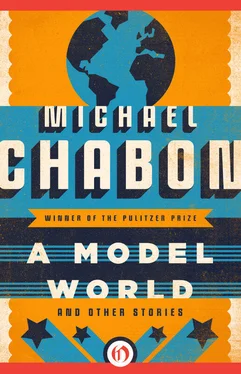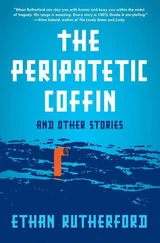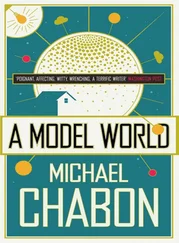Michael Chabon - A Model World And Other Stories
Здесь есть возможность читать онлайн «Michael Chabon - A Model World And Other Stories» — ознакомительный отрывок электронной книги совершенно бесплатно, а после прочтения отрывка купить полную версию. В некоторых случаях можно слушать аудио, скачать через торрент в формате fb2 и присутствует краткое содержание. Год выпуска: 2011, Издательство: Open Road Media, Жанр: Современная проза, на английском языке. Описание произведения, (предисловие) а так же отзывы посетителей доступны на портале библиотеки ЛибКат.
- Название:A Model World And Other Stories
- Автор:
- Издательство:Open Road Media
- Жанр:
- Год:2011
- ISBN:нет данных
- Рейтинг книги:5 / 5. Голосов: 1
-
Избранное:Добавить в избранное
- Отзывы:
-
Ваша оценка:
- 100
- 1
- 2
- 3
- 4
- 5
A Model World And Other Stories: краткое содержание, описание и аннотация
Предлагаем к чтению аннотацию, описание, краткое содержание или предисловие (зависит от того, что написал сам автор книги «A Model World And Other Stories»). Если вы не нашли необходимую информацию о книге — напишите в комментариях, мы постараемся отыскать её.
A Model World And Other Stories — читать онлайн ознакомительный отрывок
Ниже представлен текст книги, разбитый по страницам. Система сохранения места последней прочитанной страницы, позволяет с удобством читать онлайн бесплатно книгу «A Model World And Other Stories», без необходимости каждый раз заново искать на чём Вы остановились. Поставьте закладку, и сможете в любой момент перейти на страницу, на которой закончили чтение.
Интервал:
Закладка:
They laugh, and Roksana looks up.
“In America,” I say, “it’s unlucky to eat them.” I fold another buttery stalk of asparagus into my mouth. The Heugels shoot another round of glances at my staring wife.
“Monsieur Heugel,” I say, “how many centuries has this manor been in your family?”
“Hervé’s grandfather purchased the manor in 1948,” says Madame Heugel.
Everyone laughs much louder this time. Roksana looks up again, her face blank, her jaw working, and for one moment, and for the first time, I feel like striking her.
I excuse myself, leaving Roksana to sit at their table, to suck up all their joy and conversation like a black hole. I hate all of them.
Upstairs, I sit in the tub and hold the hand nozzle over my head for a few minutes, showering off the train ride and the strange conversation, which, after all, I may have misunderstood. Then I go back into the bedroom the Heugels have given us, which smells of cedar. With a towel on my head I step over to one of the lozenge-shaped windows and look outside, onto the yard, where the table is still covered with the wreckage of lunch and where Hervé and his father drink Calvados from little glasses. Roksana and Hervé’s mother have disappeared, perhaps into the house, and I have this brief, stupid, happy fantasy of the two of them doing the dishes together, working in smooth and wordless concert.
When I take from my suitcase the new dress shirt, white with coral pinstripes, that I bought specially at an outlet store in the rue du Commerce, because Hervé had promised to take us to a Breton club where the women would go wild over my accent, the shirt is wrinkled and my shaving cream has exploded all across the collar. I sit down on the bed, looking for a long time at the pale blue smear of foam and trying to remember the word for clothes iron.
The stairs creak. Roksana’s face is in the doorway for half a second, and I think she’s coming into the bedroom. I toss aside the spoiled shirt, but she turns and I hear her start to creak back downstairs. I shut my eyes. “Roksana.”
Plates in the kitchen, laughter outside.
“I need to be alone.”
“Please come here.”
When I open my eyes she’s in the doorway again. This time I see the anger on her face, and before the words come out of her mouth I know, with a rush of bent happiness, that we’re going to have a fight, after a year and a half of wedlock as empty and quiet as a dark theater.
“I want to leave,” she says, coming into the room and slamming the door behind her. “I’m not welcome here. You stay. They like you.”
“You’re as welcome as you choose to be.”
“No. Bullshit. They were laughing. They were laughing at me. I could tell. You were laughing at me, you bastard.”
“You bitch.”
I’m still sitting down, and Roksana steps so close to me now that the tips of her pointed black shoes come down, hard, on my toes. She throws a shadow across me.
“Please, don’t,” I say.
“I don’t know why I’m here.”
“You’re here because it’s Bastille Day. You’re here to have fun. Ouch! Can’t you ever have fun?”
Roksana looks down upon me, her eyes perfectly dry and black, and says that she hates fun more than anything else in this world, and I see that I misunderstood her when she said she didn’t know why she was here, because I thought that by “here” she just meant in Brittany.
“You sound like Khomeini,” I say, trying to slide my pinched feet out from under her shoes, and reeling somehow offended, as though I were responsible for all of us, and for the fireworks and feast days and surfeits of the entire fun hemisphere. I manage to free my feet, but now she grabs me by the ears and pulls, and it hurts.
“What do you know about Khomeini? What do you know about me? I am not fun. Do you think to run away from Iran was fun? From my mother? From the bodies of my family?”
“I’m sorry,” I say, still angry. “Fine. Go. Go back. All I have to do is say the word to Mr. Immigration and you can go right back to the land of seriousness.”
“You won’t.”
“I might,” I say, and think, well, I could. But I can’t stand the frightened, stubborn way she has narrowed her eyes or the way the room and the air between us seems filled with the cheesy smell of blackmail. I look down and my gaze falls upon the blue on my shirt collar. “You said I should have charged you. I’m charging you now.”
There is no human sound from downstairs, which means, I suppose, that the Heugels have been listening to our raised foreign voices. Roksana sits down beside me, rubbing softly now at the sides of my head. Her shoulders droop, and her little pink earrings swing back and forth like the clappers of two invisible bells.
“What is Bastille Day, anyway?”
“It’s like the Fourth of July.”
“Beer and noise,” says my wife, the ayatollah of love, remembering last year in Texas with an unanswerable frown. This year, for us, there was no Fourth of July. I woke up on the fifth, feeling guilty and strange for having forgotten, and went alone to the Burger King on the Champs-Elysées.
“I’m sorry, Brian Blumenthal,” she says at last. “I can’t do it.”
Dinner, from discussion to drinks to preparation, from further drinks to further discussion to eating, from the time we passed around five kinds of cheese for dessert to the time we wearily threw down our napkins and drank a bit more, took five hours, and now, stunned by food, I’m drifting with Hervé and his family along the heights of the cliff town of Kerguen, where we’ve come to see the fireworks. Roksana has stayed behind. The last orange light of the day flows across the houses and across the faces of the Heugels, and in the coolness, the clouds of gnats and fireflies and the smell of the nearby farms grow denser. I’ve drunk too much brandy, understood too little talk, and, as night falls around us, I feel deaf and blind. Only my nose is alive, with mown fields, livestock, low tide.
The townspeople are all out-of-doors, strolling from the place to the cliff’s edge and back, shaking hands, waiting for the display to begin; and the children and careful fathers fill the wait with match flares, loud firecracker pops and whistles and laughter, just as in the United States. But there’s that difference I always feel in French crowds, a lack of excitement that is not exactly boredom, but like an air of age, of deep habit, even among the children, as though these same five hundred people have been coming to stand and talk together forever and ever. A platform for dancing has been built, and it stands empty and brightly lighted at one end of the place , surrounded by loudspeakers and tricolors.
We hear the first commanding bang from across the inlet and lift our eyes. The fireworks are fireworks; they spray and glitter and lightly move me like every display of fireworks I have seen in every July I remember, and lingering octopi of smoke float over our heads. During the applause and cries after the long last outburst, Hervé takes my arm and pulls me down along the cliffs, where we kick stones out into the water, and he surprises me by asking if there is anything wrong. I try to find the French for it; I tell him about all the useless gold in her downturned mouth.
Hervé says, “Oh la la,” which I didn’t think Frenchmen ever really said; and in a language that is always wistful, it is the most wistful phrase that I have heard, and I start to cry.
And then he says, “Why did you marry her?” although he already knows the practical and bureaucratic answer to this question.
We walk farther and stand high above the water on the last two feet of Kerguen. “She is not pretty. Elle a une drôle de tête . And she is so gloomy, it must be said. No, it’s a good thing you did, perhaps. I see that. But it’s an arrangement. No? And she understands. You are the one who makes the mess.”
Читать дальшеИнтервал:
Закладка:
Похожие книги на «A Model World And Other Stories»
Представляем Вашему вниманию похожие книги на «A Model World And Other Stories» списком для выбора. Мы отобрали схожую по названию и смыслу литературу в надежде предоставить читателям больше вариантов отыскать новые, интересные, ещё непрочитанные произведения.
Обсуждение, отзывы о книге «A Model World And Other Stories» и просто собственные мнения читателей. Оставьте ваши комментарии, напишите, что Вы думаете о произведении, его смысле или главных героях. Укажите что конкретно понравилось, а что нет, и почему Вы так считаете.












